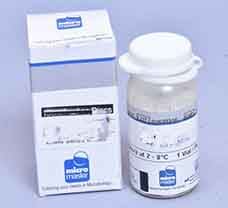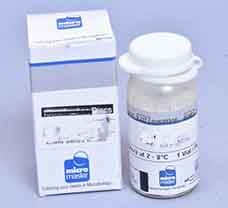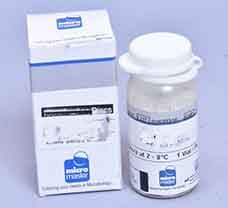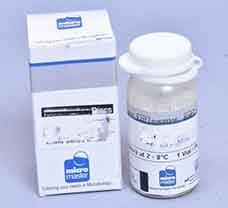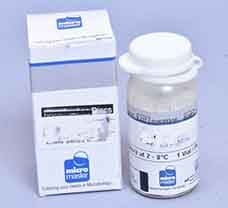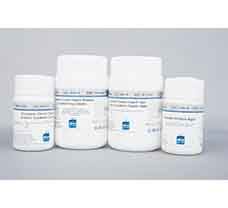
Deoxycholate Citrate Agar
- Brand: Micromaster
- Catalog No.: DM577-500g
- Quantity/Unit: 500g/Pack
- Usually Shipped in: 1-2 Weeks
Min Orderable Qty : 1 Pack
For lab/research use only, unless otherwise specified
Deoxycholate Citrate Agar is supplied by Micromaster. It is available in the form of a light yellow to pinkish beige homogeneous free flowing powder which has a pH in the range of 7.3 to 7.7. This product should be stored below 30C in a tightly closed container. Once opened, it should be properly stored, after tightly capping the bottle. Due to the hygroscopic nature of the product, there could be chances of lump formation which can be avoided by proper storage. Store in dry ventilated area protected from extremes of temperature and sources of ignition.
Quantity provided: 500 g/pack
Deoxycholate Citrate Agar is prepared as per the modified formula of Leifson and is recommended for the isolation of enteric pathogens particularly Salmonella and Shigella species. The selectivity of this medium permits the use of fairly heavy inocula without danger of overgrowth of Shigella and Salmonella by other microflora. This medium is similar to deoxycholate agar in comparison but is moderately more selective for enteric pathogens owing to increased concentrations of both citrate and deoxycholate salts. Sodium deoxycholate at pH 7.3 to 7.5 is inhibitory for gram-positive bacteria. Citrate salts, in the concentration included in the formulation, are inhibitory to gram-positive bacteria and most other normal intestinal organisms. HI solids is a source of carbon and nitrogen and this ingredient is used because the inhibition of coliforms produced is greater than when an extract or simple peptone is used. Proteose peptone provides carbon, nitrogen, vitamins and minerals. Coliform bacteria and gram-positive bacteria are inhibited or greatly suppressed due to sodium deoxycholate, sodium citrate and ferric ammonium citrate. Dipotassium phosphate buffers the medium. Lactose helps in differentiating enteric bacilli, as lactose fermenters produce red colonies while lactose non-fermenters produce colourless colonies






